Stories
Reports, interviews, essays, and opinions about music and its connection to business and society.
«We are relatively free to organise the Record Store Day within our territory»
On April 20, Record Store Day is about to go down again all across the world. We have asked Carsten Wetzl, project manager of the vinyl-celebrating day, what it's all about.
It is the one day that vinyl lovers have circled in bright red in their calendars: The Record Store Day (RSD). Every year, we see peculiar and exclusive releases—some quickly become high-value targets for collectors.
We had the chance to ask Carsten Wetzl a few questions ahead of this year's Record Store Day on April 20. The 30-year-old has been working for Record Store Day in German-speaking countries since mid-2021.
Carsten, you are the project manager for the Record Story Day in Germany, Austria and Switzerland. What does that mean exactly?
I, or rather we, primarily act as the interface between the participating record shops and the distributors. I collect and update the release lists and those of the participating shops, answer questions, provide assets, and so on.
There are also many other topics, such as initiating RSD releases with selected artists, searching and negotiating with partners and sponsors, working out the campaigns, selecting and coordinating RSD ambassadors, initiating the RSD design competition and generally looking after the website and social media channels, to name just a few areas of responsibility.
How does the international organisation and coordination of the RSD work?
It really varies from country to country. Of course, the USA has some guidelines on how certain things should be organised. However, we are relatively free to organise things within our territory and regularly coordinate with the RSD offices in the US, UK, Netherlands, France, Sweden, etc. The RSD now exists almost everywhere in the world.

This year, the RSD is entering into a partnership with Marshall. What can we expect from this?
You can expect fascinating campaigns. What's special this year is that Marshall (Headphones & Speakers division) also focuses on the shops themselves. That's why you can marvel at new Marshall headphones at the monitoring stations or Marshall speakers for sound reinforcement in many selected shops. With Coretex in Berlin and Hot Shot in Bremen, Marshall has also selected two great Marshall x RSD Ambassador Stores.
Great promotions for end consumers, such as the Marshall goodie bag with lots of exciting items that can be won in selected shops, are also available. One or two cool promotions will also follow.
However, the partnership is limited to Germany…
It is simply due to Marshall's focus and objectives. The Headphones & Speakers division hasn't been around for very long, and with 240 participating shops in all three countries, you first have to get such cooperation under one roof. You have to start at some point. But this is the first year of our collaboration, and I'm sure that the whole thing will be expanded in the coming years.
Vinyl has been celebrating a small but steady comeback for years. What reasons do you see for this?
I think there are several factors at play. We humans often have this «collector's gene», which you can recognise in the younger target group in particular. They often don't even have a record player but simply want to own certain records. That certainly plays a role.
For the people who also listen to the records, it is an entirely different listening experience to consciously put on a record, open a cool drink and get the best sound experience simultaneously.
Which release are you personally really looking forward to at this year's RSD?
I look forward to getting the 7" from Frank Turner or Milky Chance. The titles from Drangsal and Olivia Rodrigo & Noah Kahan are also up there. But as I also have to go to the shops myself to get the releases, it remains to be seen whether I'll be able to get my wishes or whether I'll have to expand my wish list again after all.
The Smart Grinders
Soft Loft kicked off the album tour at Salzhaus Winterthur. We are diving into the band's past and promising future.
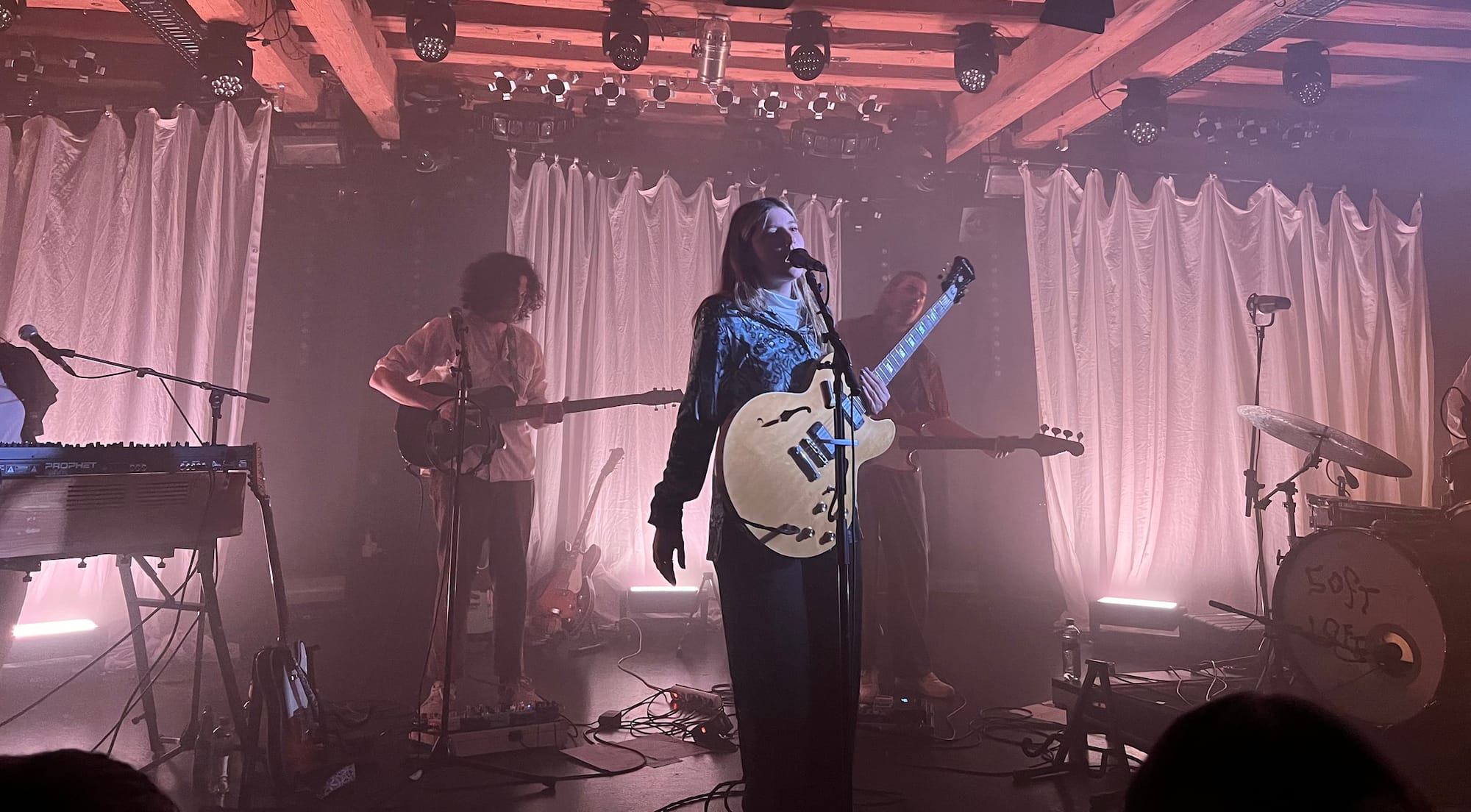
Whenever a band seemingly suddenly blows up, there are always reasons for scepticism. Most of the time, it is a mirage, a story we love to hear, but it is far from the truth. And the truth is that there are years of grinding preceding success.
So, where does Soft Loft fit in? Do they belong to the incredibly lucky ones? Or are they part of the grinders?
March 2023. Soft Loft released their debut single, Is It Me, an astounding song we featured in our Weekly5: «The subtle composition creates a dreamy yet driven canvas on which Jorina Stamm casts a vocal painting of vulnerability, uncertainty, pain, and heartbreak, delivered with haunting urgency and almost despairing emphasis.»
Soft Loft would go on to publish one single after another—each one exceptional. The EP, In Case You Still Get Lonely, was released in June. Two more singles, Rose Colored and Happy New Year.
How was this possible?
Genius Rebranding
To explore Soft Loft’s origins, we must go back in time quite a bit. On January 18, 2017, Negative White hosted the premiere of Strange World, the debut single of Ellas:
5 Songs That Inspired Laddermen
Lucerne trio Laddermen have released their new EP, «And Now You’re Bored.» We asked the band to share five songs that have inspired their creative work.
Laddermen, based in Lucerne, Switzerland, revolving around the Texan singer and guitarist Leopold Oakes, have released their new EP, And Now You’re Bored. The collection of five songs is a testament to handcrafted sophistication, decorated with longing and melancholia.
There is Programmed for Pleasure, a hauntingly atmospheric composition driven by a playful guitar, significant for classic indie rock, contrasted by Oakes’ monotonous delivery that adds to the darker ambience.
Big City then provides a sombre and meandering composition full of melancholia. It’s a haunting fusion of light-weight indie-rock and the song’s underlying sophistication, which demands a few listens to unveil its beauty.
And there is also Texas Winter, delving into a sad indie-folk full of heartfelt yearning.
And Now You’re Bored, the follow-up to their 2021 debut album Special Kind of Violence, shows the band’s development from a rougher sound to intricate compositions. These songs, despite their melodic foundations, are not sonic fast food; they need time and space to grow until they finally bloom to their fullest. But once they do, And Now You’re Bored becomes a small, shimmering art-rock gem.
To better understand how these songs were conceived, we asked Laddermen to share five songs that inspired their creative work and their urge to become musicians. Songwriters Leopold Oakes and Michael Widmer agreed to open their catalogue of influences:
Interpol – Stella Was a Diver and She’s Always Down
«I could go into great length about why this song means so much to me, from the interweaving crunchy guitars to Paul Bank’s crumbling voice, but the bottom line: I heard this song when I was 15, and I had never heard anything like this before, nor have I ever since. The nostalgic ties of me in puberty with young angst figuring out the world, all while Interpol being my theme tune, affected me deeply and is one of the reasons I wanted to make music.»
—Leopold
Phoebe Bridgers – Scott Street
«Phoebe Bridgers’ first album, Stranger in the Alps, was a big musical revelation for me when it came out back in 2017. It made me fall in love with indie folk music and led me to discover artists like Elliott Smith, Laura Marling and Feist.
I especially love her song Scott Street from that first album. Like Phoebe, I’m a sucker for a 5-minute-long, non-linear song with a big build-up and giant outro - which is what Scott Street executes masterfully. It’s inspiring how she’s able to write fragile songs but still have these big, driving moments that suck you in completely.»
—Michael
La Dispute – King Park
«La Dispute has always had a special place within me due to the poetic nature of the lyrics and the absolute rawness of the vocal delivery. That, in tandem with the melodic distorted guitars and driving bass, gives a sense of hardcore mixed with emo rock that is undefeated. I respect the way they deliver a story and the unfiltered nature of their tone.»
—Leopold
Nick Cave & the Bad Seeds – Skeleton Tree
«Nick Cave might as well be my favourite songwriter of all time. In 2016, he released the album Skeleton Tree, in which he processed the tragic death of his son. The title track and last song on the album are maybe my favorite of the bunch. In it, he accepts that sorrow will remain with him for the rest of his life and, in that way, also steps out into the world again after experiencing tragedy.
It boggles me how he was able to continue writing such beautiful music in a state of emergency. Not only that but it’s inspiring to see what writing songs and making music still means and does to him after already having such a prolific career.»
—Michael
J Dilla – Last Donut Of The Night
«Despite not directly influencing our own music sonically, J Dilla’s album Donuts had a profound impact on me. It shows how far creativity can take you and that you don’t necessarily need a ton of equipment to make great music.
Dilla produced Last Donut Of The Night on his deathbed in the hospital with just an MPC 3000 and a couple of 7” records that he sampled. It’s inspiring to see what music meant to him until the very end and how he changed the path of Hip Hop.»
—Michael
Our Diary of m4music 2024
Negative White is attending the m4music Festival 2024 in Zurich. Two days of conference and live performances. Here is our diary.
Part I
Preparation
15.03.2024 • 08:45
Okay, the countdown is running: One week until m4music officially opens its gates.
And I can’t postpone the necessary preparation work any longer. I have to have a plan, which I will inevitably throw overboard during the festival because that’s just the festival’s nature.
But here’s my preliminary plan for the conference on Friday:
- A love story – SRG and the Swiss music industry
- Sexualised violence in the music industry – prevention and awareness
- Music and AI Now is the Future of the Past
On Saturday, I’ll probably only attend «Fair pay in the music scene: between expectations and reality» since I’ll also hang out at the invite-only «Business Mixer Brunch» by Swiss Music Export.
By the way, the official conference panels are free, so if you’re curious about any of them, you should definitely drop by. Here’s an overview of all panels.
I feel that the panels have become way more artist-focused, which is not bad but less attractive for me to cover as I’d be more curious about industry challenges. Also, a more fun and lighthearted panel is missing.
18.03.2024 • 07:25
After my recommendations for the conference, it’s time for the concerts I’m most looking forward to at this year’s m4music festival.
Moonpools
My favourite Moonpools memory dates back to July 2022. They’ve released their single, Damaged Goods, which immediately landed in my heavy rotation. We spent a week in Scotland and, one day, picked up two hitchhikers. The song was playing faintly in the background. One of the guys was in awe and asked who was playing. So far, I haven’t seen the Swiss band live. After their incredible new single, Never Mind, I can’t wait for their show.
Mary Middlefield
I could get a taste of Mary Middlefield’s raw live performance at last year’s «Musikfestwochen» in Winterthur, leaving me wanting more. She performs her indie-folk songs with the verve of a rockstar: intense, pressing, demanding.
BARON.E
The Swiss electro-pop duo BARON.E has been floating around my head since 2021’s COMME RÊVE. Their oscillating quality, paired with a love for detailed melodies, always grabs my attention. As with the Moonpools, I haven’t had the chance to catch them live on stage. It’s finally time to see them.
Hannah Jadagu
Last year, US artist Hannah Jadagu released the exceptional debut album Aperture. Songs like Warning Sing or Lose combine refined songwriting, soul-esque grooves, and rough-edged rock flair. And since up-and-coming musicians from the States rarely come to Switzerland, it’s definitely a must-see for me.
Deadletter
Skimming through the festival’s line-up, Deadletter stood out, but then again, I’m a sucker for UK post-punk, and the band adds a flavour of DIY and 2000s indie-rock to the sound. I’m predicting a sweaty and escalating show.
Part II
Festival
22.03.2024 • 08:21
Good morning. Today, I will start scribbling in this festival diary for real. And the first day obviously needs to start with fuel.
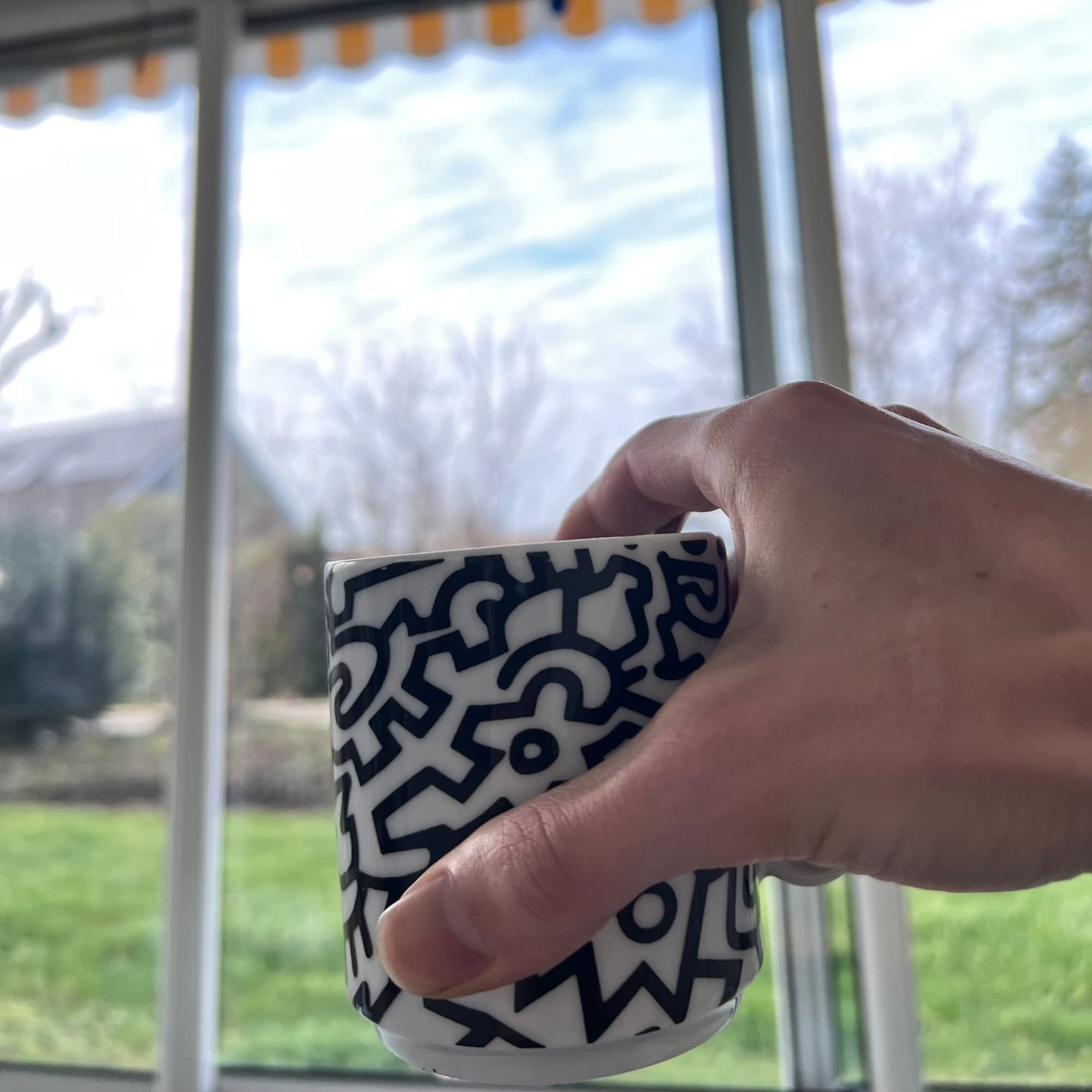
I’d say I’m more or less prepared for the whole thing, but I still need to pack the essentials. In a way, m4music is unique since I get to sleep in my own bed tonight, but simultaneously, it’s also a drag not to have a place to sleep really close by—even if it just would be a tent.
22.03.2024 • 12:30
Okay, all set and on the way. I’m not sure if the laptop will be really necessary; we’ll see. Better save than sorry.
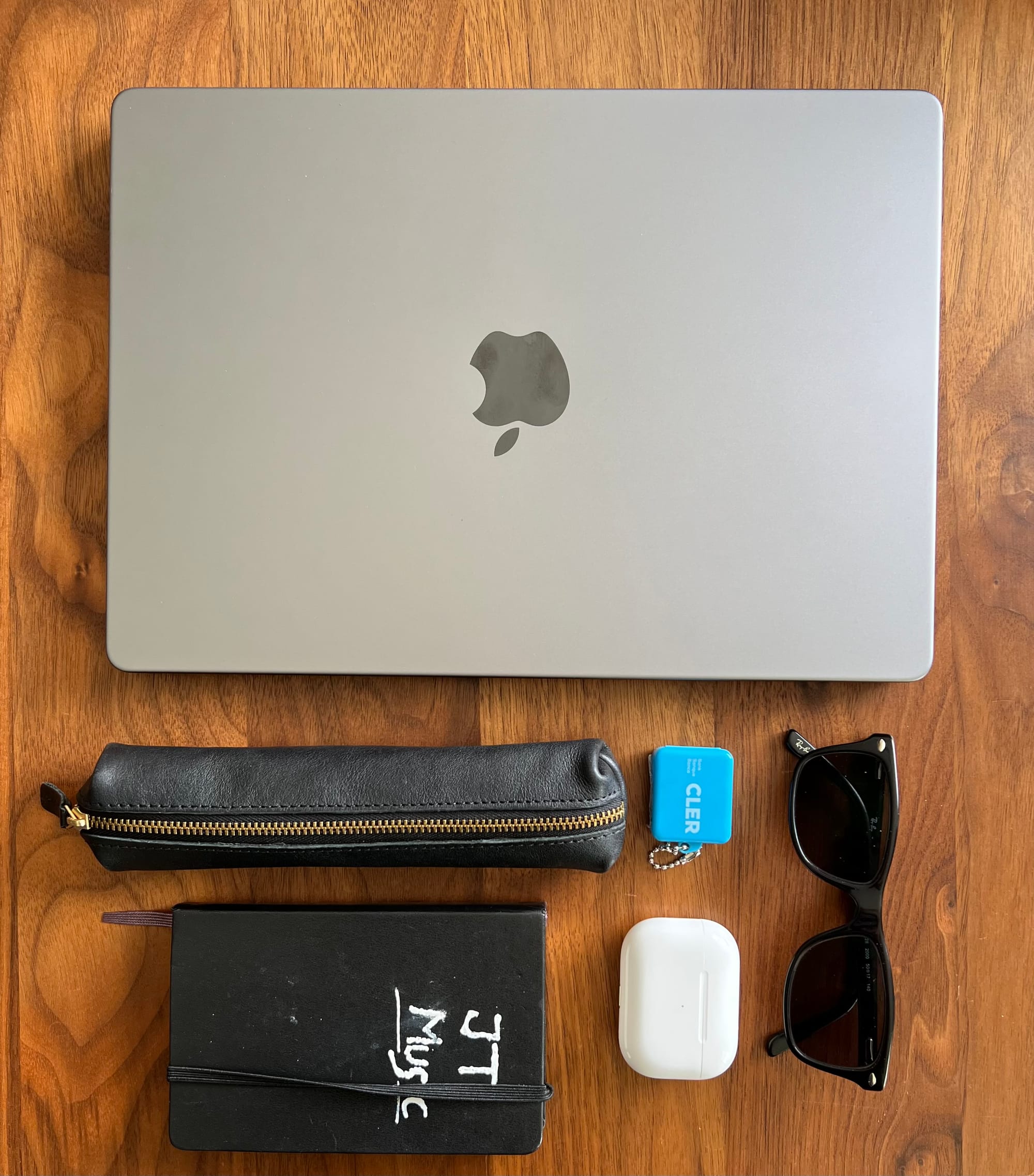
22.03.2024 • 13:30
Okay, it feels like always: A slow start, people hanging around, chit-chatting, saying hello. Some drink beers, while others still rely on coffee. The sun’s shining, life’s good.
And as always, the growing crowd is a unique blend of business casual industry guys, cliché rocker dudes, and everything in between. For now, I’m just waiting for the first panel to start. And I think I’ll stick with Mate for now.
22.03.2024 • 16:00
As expected, the plan starts to fall apart. I’ve been to the SRG panel; however, as soon as I sat down, I thought this might get quite boring: It was supposed to analyse the relationship between Swutzerland’s public broadcaster and the music industry. «A love story,» as the panel’s title hinted.
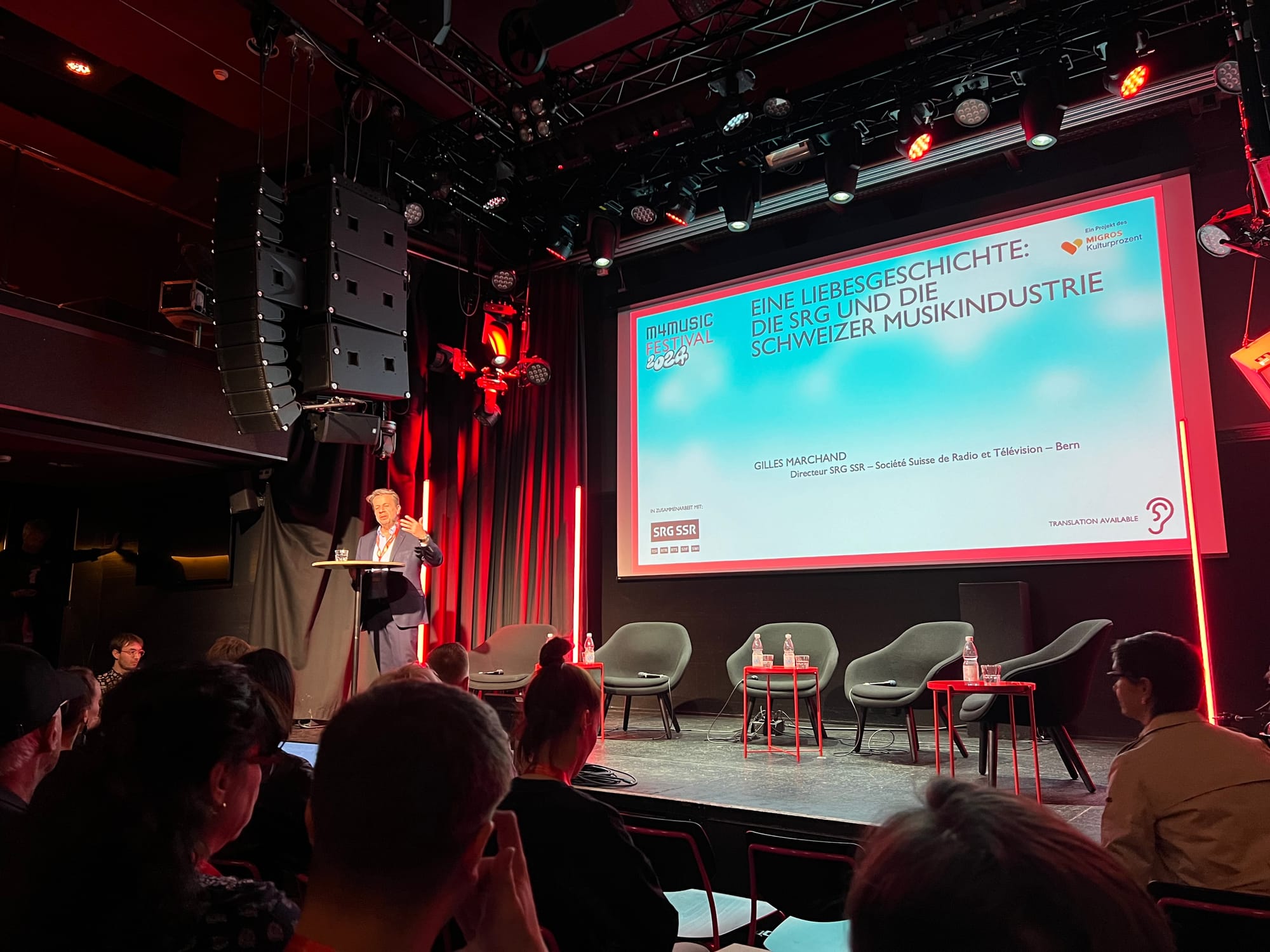
The panel started with a speech by Gilles Marchand, the soon-to-be-ex director of the public broadcasting institution. He obviously praised the SRG’s efforts in promoting Swiss music, and some of the numbers he presented were quite impressive. Then again, this speech could have been a PDF.
The essential question, the political threat against the SRG, was only touched lightly. If you’d like to know more about the potential impact of cutting the public broadcasting fees in half would have on the music industry, check out this article:
 Negative WhiteJanosch Troehler
Negative WhiteJanosch Troehler
Marchand’s speech was followed by individual presentations of the language divisions of SRG. Also, impressive numbers, cool visual trailers, but ultimately nothing new or controversial. The actual discussion panel, featuring two SRG people and two people from the music industry, started off with enough cringe to get out and start with the first beer.
22.03.2024 • 18:00
My plan completely derailed. I skipped a couple of panels and caught up with some people instead. Mary Middlefield drones over the place outside of Schiffbau, the festival’s primary location.
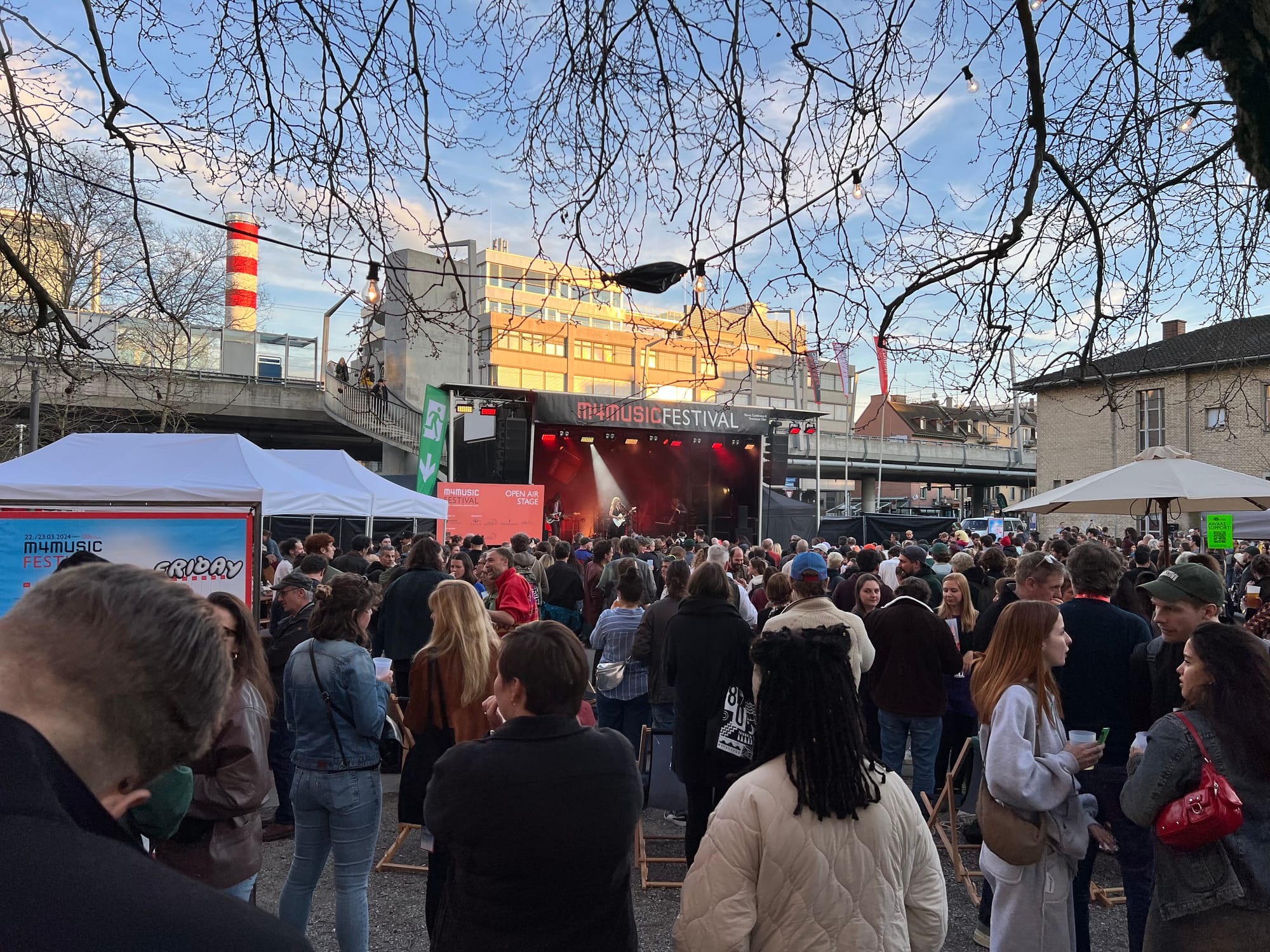
We’re talking about wokeness, awareness, and the fact that the Swiss music industry is too nice. No drama. No scandals. Everybody’s playing ball. Cheap supermarket beer fuels the debate.
22.03.2024 • 20:00
I’ve been slacking around a bit. Undoubtedly, witnessing the saddest moment so far when Neil, singer of Bahnhofbuffet Chancental, kicked and spilt his beer.
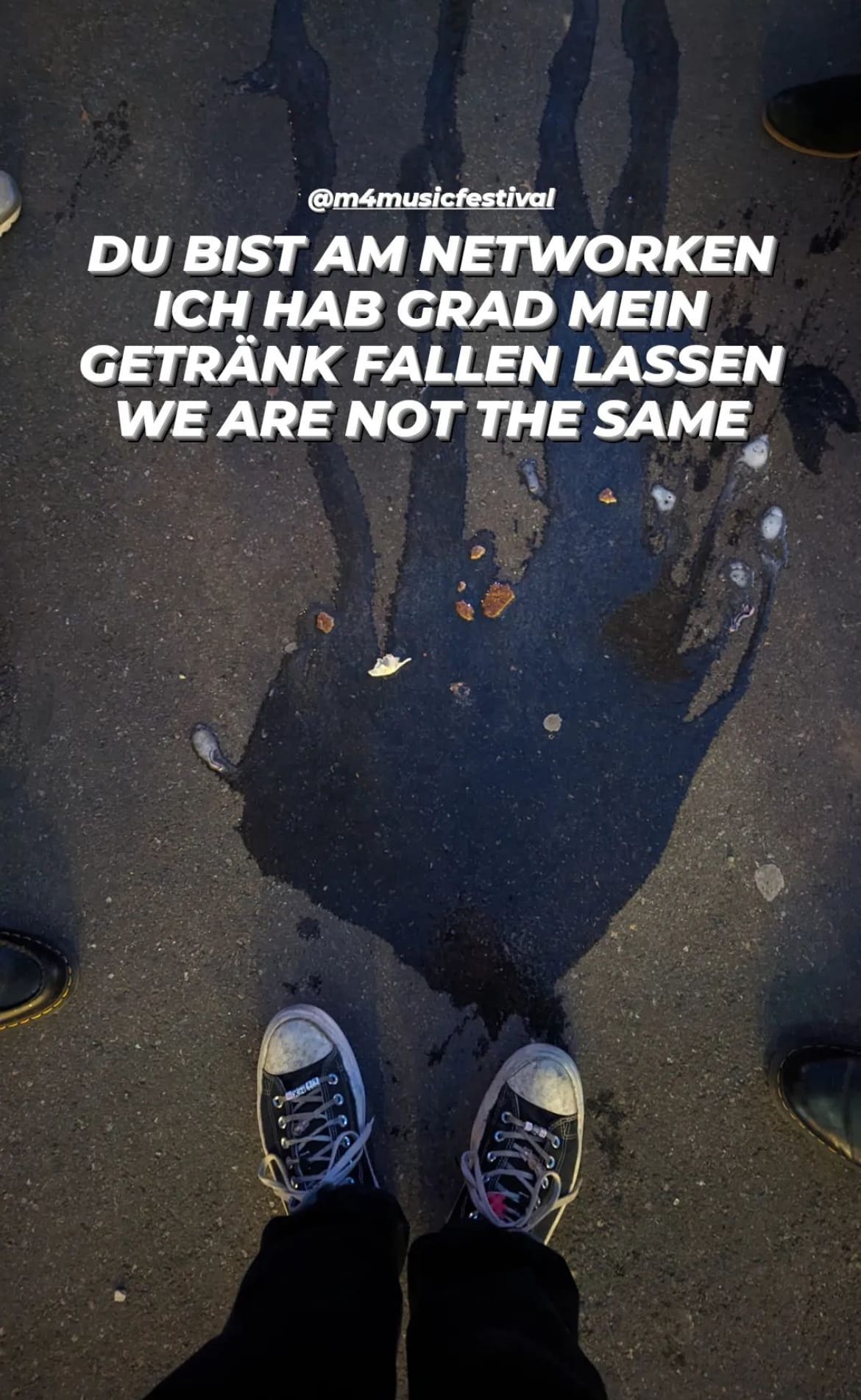
Also, I had a quick chat with Frank from Lautstark, a music promoter. Now, it’s time for music. Club Exil. Deadletter.
22.03.2024 • 21:00

It smells like sweat, beer, perfume, and maybe a bit of piss. The only atmosphere the UK band Deadletter truly deserves.
They play with the aggression of earliest post-punk, dressed in 90s grunge, handling their instruments with the exceptional sophistication of art-rockers. Explosive. Disruptive. Angry.
One can’t be sure if it’s their attitude or the frontman is actually pissed. The audience could have been more enthusiastic, but that’s just Switzerland for the most part… No comparison to a pub full of drunk Englishmen.
And the saxophone… oh my! If you can, see them!
22.03.2024 • 22:25
After Deadletter, it can only go down. Well, probably. Right now, and that’s the exhausting thing about m4music, I can’t walk 10 meters without saying hi to someone.
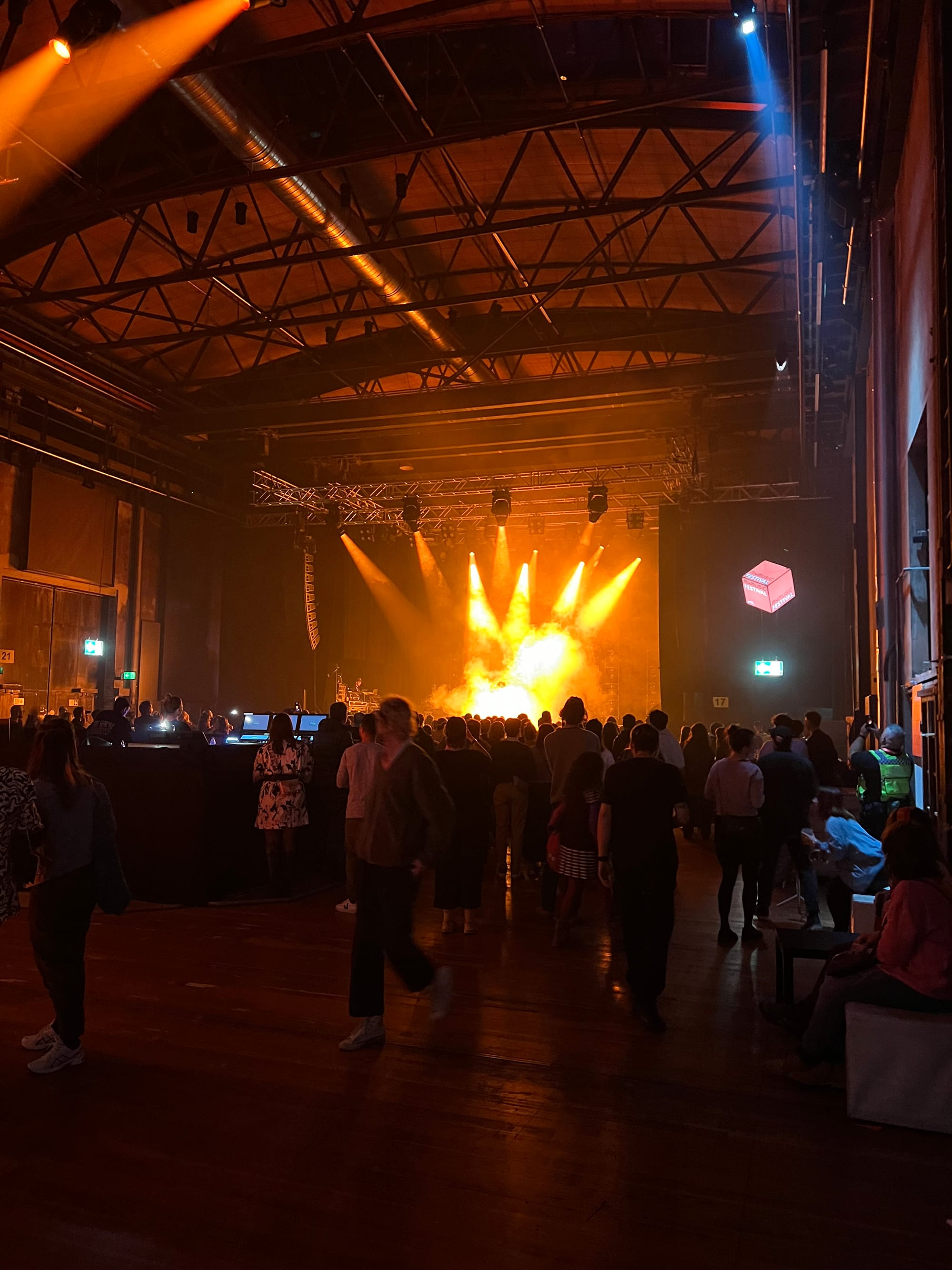
That’s why I sit in the Hall, the biggest stage at the festival, and a guy from Paris is playing. Aime Simone. I don’t know, and it sounds rather underwhelming.
23.03.2024 • 00:16
On the train home, or at least in that direction. I’ll have to call a cab to get home. But it was time and a good opportunity to say goodnight. The first day is done—and, unfortunately, but expectedly, relatively unspectacular.
However, some of the conversations I had (which made up the bulk of my first day) went deeper, discussing the broader challenges the music industry is currently facing. But, let’s be honest, we also reminisced a lot about past times.
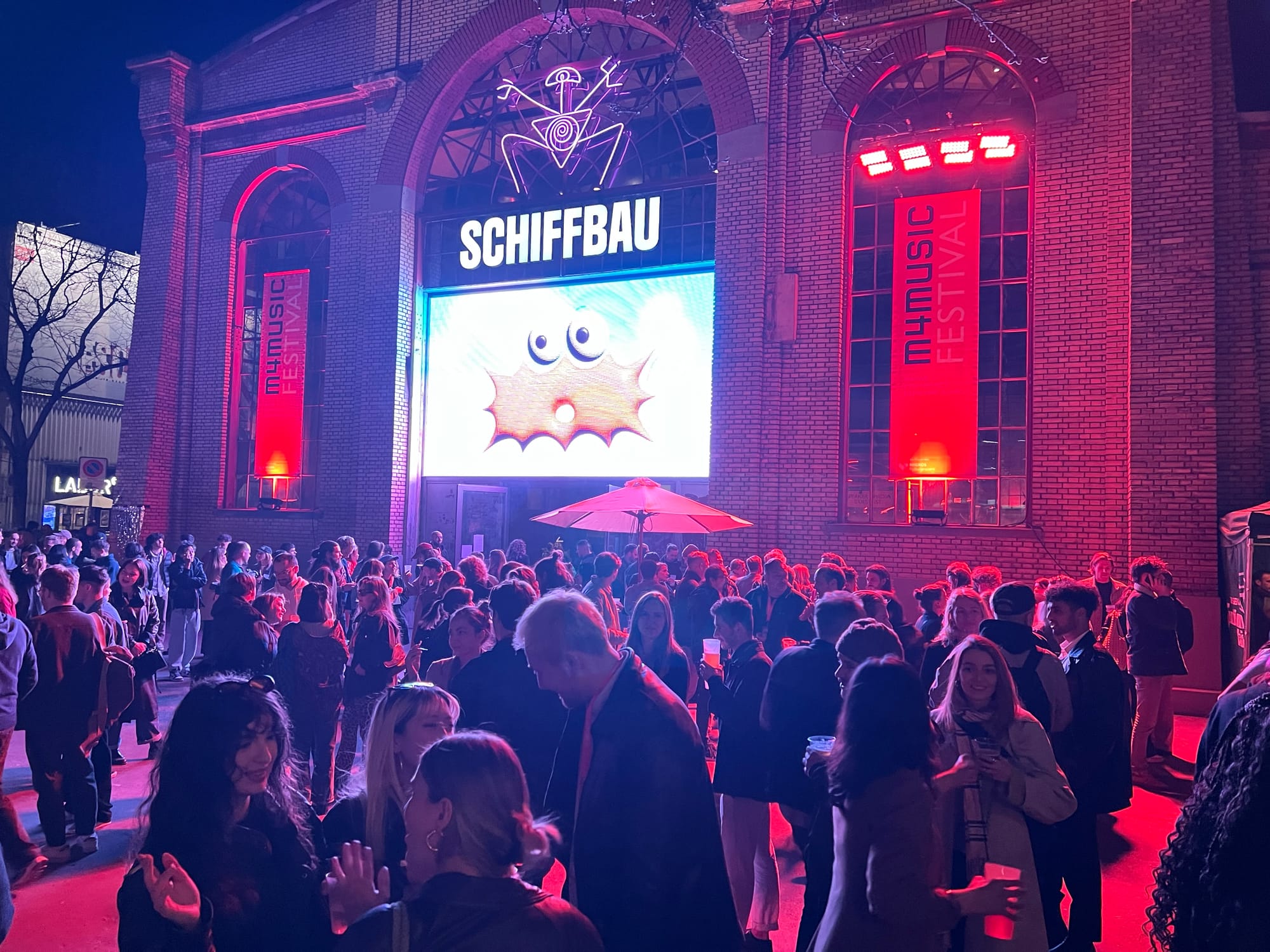
It’s the beauty but also the dirty little secret of m4music: The music is incidental. It’s about seeing and being seen, about connecting and networking—building relationships—especially for younger artists. I met a woman who worked in my team a few years ago, moderating comments for a big media brand. She has now started creating music. For her, the festival provides the perfect opportunity to learn and meet people.
The industry aspect of m4music seems more profound this year: The conference mainly provides hands-on information for musicians, event organisers, or other professionals. Admittedly, for me, the unfortunate thing is that these topics make rather boring stories, even for overly interested music fans. It’s too nerdy.
Nevertheless, tomorrow—well, later today, actually—there are definitely more bands I plan to see. But you know, plans and m4music don’t really work out as intended.
23.03.2024 • 09:15
After two coffees, I’d consider myself halfway living again. A glance out the window offers all the reasons you’d need to stay inside: It’s cold, wet, and terribly windy. But it can’t stop me from finally seeing Moonpools today, whose song Never Mind is already a high-chance contender to land on this year’s best list.
I had the chance to talk to Alain and Arthur from Young+Aspiring, Moonpools label and booking agency. They assured me their upcoming EP, Hide and Seek, will feature another excellent banger. They also revealed that there are about ten demos for their debut album. I’m already excited.
23.03.2024 • 12:30
I’m later on the train to Zurich than I originally intended. I needed more time to get in a ready state, ready for another night of standing around, talking, and listening.
Some of yesterday’s discussions are still ringing in my head—especially those around the function of music journalism in small Switzerland.
If you’re a regular reader of Negative White, you might find that we rarely write negative things about Swiss artists. There are two reasons:
First, Negative White is a volunteer project. Nobody earns any salary, and at least I have no interest in spending my free time ripping apart music I don’t like. Then, I would not write about it, although I know it would generate way more traffic.
Second, I see a significant difference in writing about an artist’s work, critiquing or praising it, and reporting on the industry itself. The latter requires much more journalistic distance and rigour. There is no reason or need to be overly cautious reporting on institutions and large organisations.
23.03.2024 • 14:15
Just came out of the interesting «Fair Pay» panel, which definitely needs some more digestion. But now, with perfect sunshine, Moonpools.
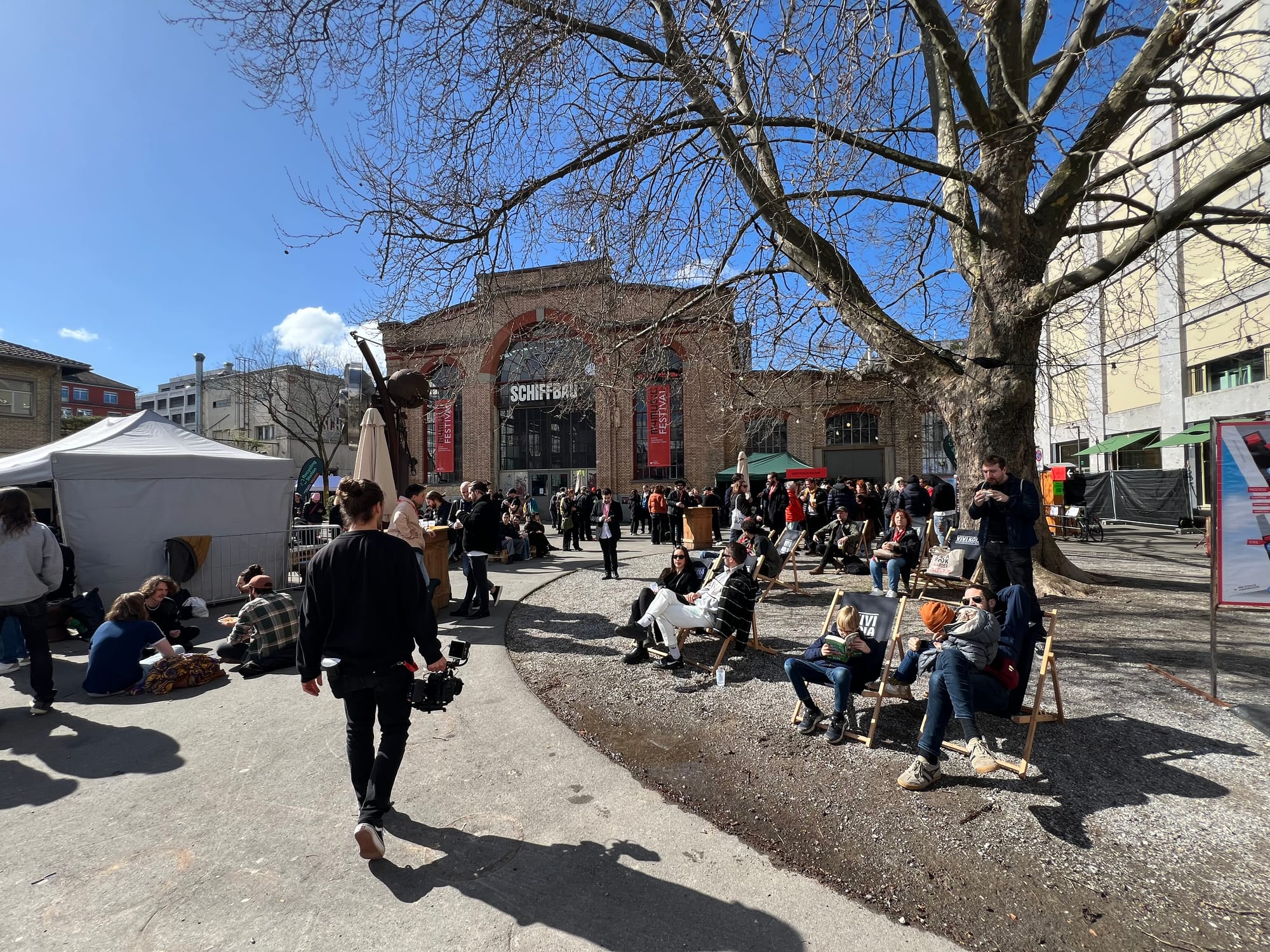
23.03.2024 • 15:11
Moonpools promised. Moonpools delivered. The Swiss band pushed its already heavy wall of sound with pressure over the sunny place without compromising on the dreamy wave elements.
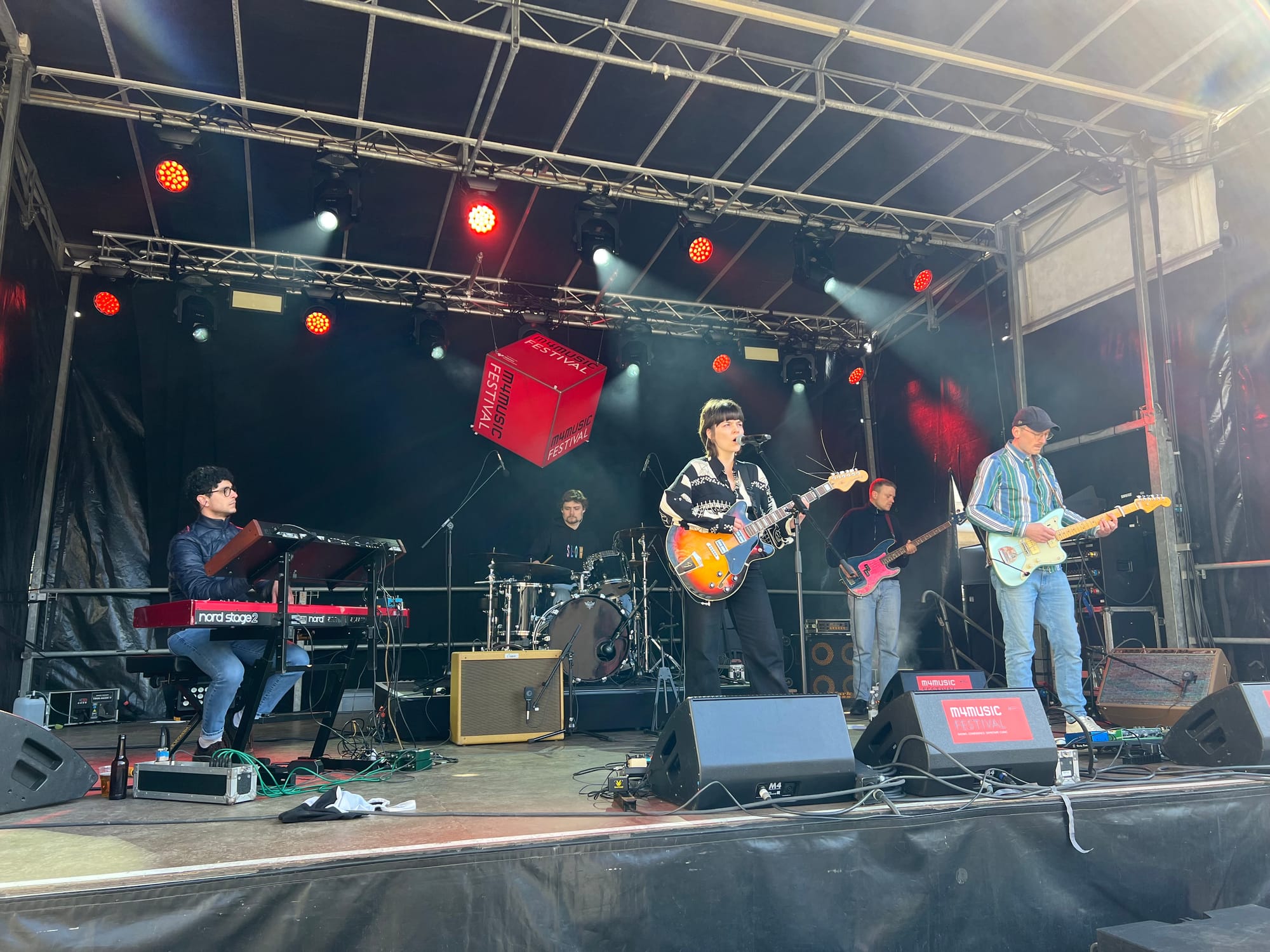
23.03.2024 • 15:55
Waiting for Obliecht to start. First beer.

23.03.2024 • 16:15
Obliecht. Atmospheric dulcimer indie rave sound with Swiss German and English lyrics. Weird but good.
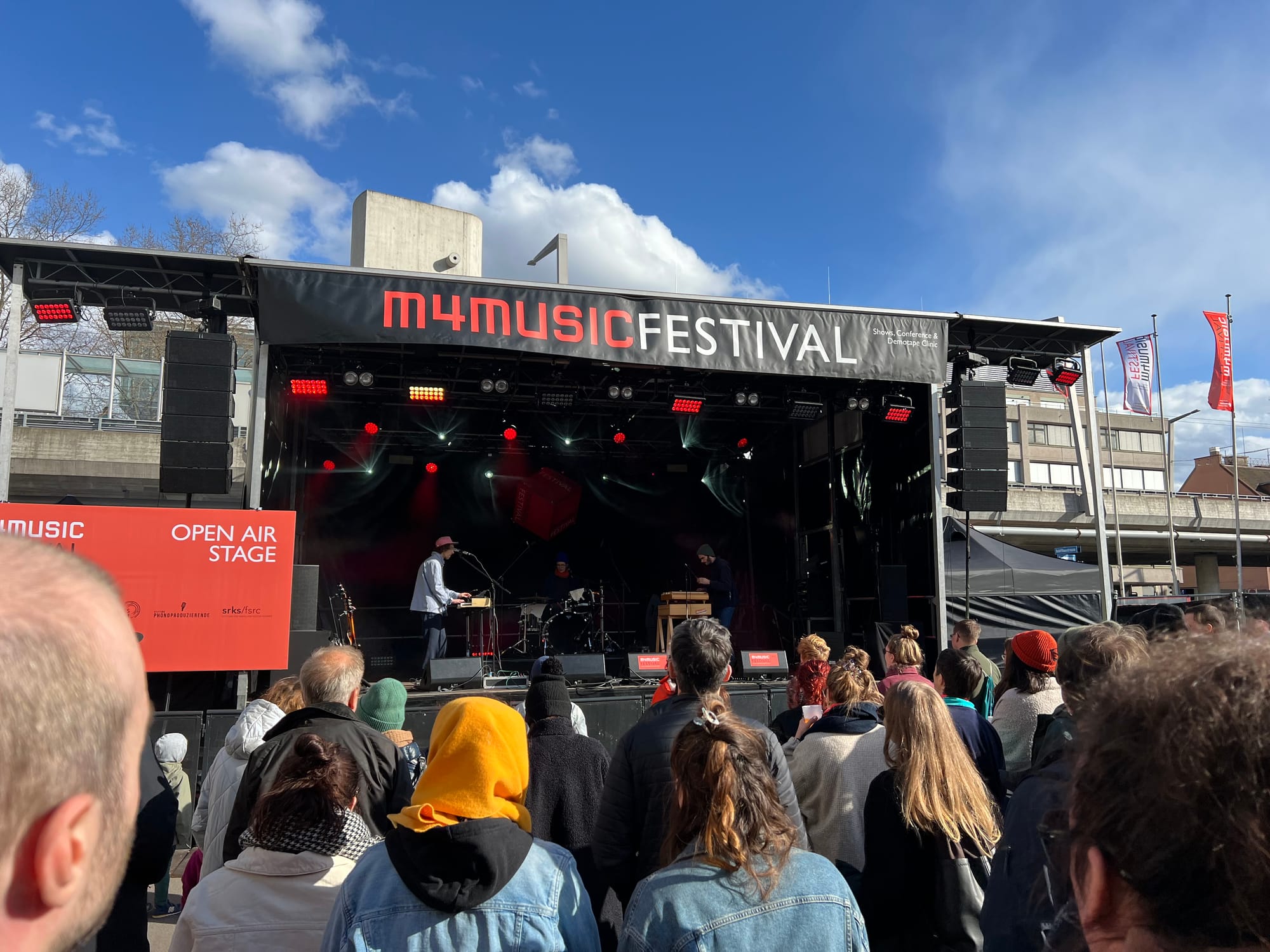
23.03.2024 • 19:25
Alright, a quick update on what happened. Had a couple of beers and met a couple of people—old and new. And I saw EDB, a Swiss guy, live on stage. With his Swiss German lyrics, he certainly has boundaries, but his show was energetic and charismatic. Now, I’m mostly looking forward to Hannah Jadagu.
And, completely honest, after that, I’m probably done.
23.03.2024 • 20:50

Hannah Jadagu hammered heavily in Exil Club. Between sugary melodies, raw rock energy, droning noise, and R&B groove, her performance was incredibly cool. The loudness perfectly contrasted with her soothing voice, and when the sound got more complex, Jadagu and her band really shined in sophistication and brilliance.
23.03.2024 • 21:30
Alright, final entry of the festival part of this diary. I call it a day shamefully early, but I’m too old for FOMO, and Hannah Jadagu’s concert seemed like the perfect final closure.
Over these two days, I’ve experienced great performances by local and international artists, reconnected with musicians and industry people, and generally had a good time. But there’s also some criticism, which I’ll elaborate further in the diary’s third and last section in the coming days.
In the meantime: Thank you if you followed my reporting so far. 🙏
Part III
Final Thoughts
The m4music 2024 is now part of history. Although an overall urgency was absent from both the festival’s line-up and the conference, it was again a must to be there. It is the one event almost everybody in Switzerland’s indie music scene is attending and for me to have some face-to-face time with people whom I only am in contact via email throughout the year.
So, in a way, it doesn’t really matter if the programme is better or worse—the main focus remains networking and relationship-building. However, that makes for a terrible report.
On the other hand, I could still experience some musical highlights: Deadletter, Moonpools, Obliecht, EDB, and Hannah Jadagu delivered all energetic and impressive performances I shall fondly remember. Also the moments of genuine laughter and fun. Or profound debates with people, which added new insights and perspectives to my understanding of the challenges of the music business.
Nevertheless, when I reflect on this year’s festival edition, everything felt a bit too cosy, a bit too nice. There may be no need for a big scandal, yet a pinch of controversy and opposite opinions might create more intrigue and new ideas. I couldn’t shake the feeling that the business remains stalled in the face of significant global shifts.
«I’m done with just having music as a coping mechanism. There must be other ways, hopefully…»
Hubert Tuyishime, aka Porcelain id, released their debut album, «Bibi:1», mid-February. A conversion about identity, traumatic experiences, and music as a coping mechanism.
Hubert Tuyishime is bridging cultures, identities, and styles. As Porcelain id, the artist who migrated from Rwanda to Antwerp, Belgium, released their album Bibi:1, which received exceptional praise.
«We are only at the beginning of this calendar year, but this album could easily end up on many end-of-year lists in ten months’ time,» writes Bryan Regtop for «Dansende Beren».
The resonance had been «honestly amazing», Tuyishime tells Negative White in an interview via video call. «I got much more press than expected,» adding that keeping expectations low was a form of self-protection. «The feedback from fellow musicians was a different kind of acknowledgement. People who are better at what you do are into what you created.»
Bibi:1, released mid-February, is a highly condensed debut album containing eleven tracks, with Feeling being a short interlude in the record’s middle.
But most of all, it is a stunning work of art. Porcelain id provides at its core a folky canvas yet paints with a vast pallet of colours—indie-rock strokes, dots of electronica, faint brush tips of hip-hop, even splashes of experimental noise.
The songs effortlessly blend Western sounds with exotic elements. Some, like Low Poly or Adam Coming Home, conjure memories of The Libertines. The opener, Habibi (R U Alone?), and closer, Lights!, remind us of Nick Cave.
Occasionally, Porcelain id plays with reduced compositions—as in Moon—emphasising effects and melody. Then again, indulging in opulent grand gestures in Man Down!.
The duality, juxtapositions, harsh breaks, and sophisticated contrasts within Bibi:1 are deeply rooted in Tuyishime’s story. On the one hand, their musical upbringing brought a wealth of versatility. This diversity of influences led to the conclusion never to choose just one thing.
Then again, the album is inspired by the city’s neverending buzz. «There is never just one thing going on. You can’t really catch a break,» Tuyishime explains. «I come from a small village, so most of my world has either been on the internet or a very small group of friends or community.»
Being in the city for the first couple of years was a shock, artistically expressed in Bibi:1 through its variety of sound, or as they put it: «It would have been a shame if I only picked a single genre or experience to be the album,» Tuyishime elaborates.
«It’s about culture; it’s about finding your identity.»
The intense collaboration of Tuyishime and producer Youniss Ahamad further drove the experimental sound. Ahamad brought a significantly different musical background to the table. Ahamad started weaving non-Western elements into the sound, like the extensive use of the duduk.
«These elements brought an almost literal soul to the album. We could have done it without it. It could have been a trumpet or anything else. But it very much is not, so it goes into what Youniss works around a lot in his music. It’s about culture; it’s about finding your identity.»
Tuyishime has a hard time illustrating the significance of these sounds: «Those sounds, really… I don’t know. It’s like trying to explain who you are. That’s really hard. Youniss brought me an opportunity to find some kind of identity, to connect me to a culture that was close but I did not grow up with. It is one of those things that I will keep studying and looking into.»

«The upward failing of trying to sound like someone. I’ve tried my whole life, and I still do probably.»
The diverse sounds, paired with its sometimes sharp contrasts, make Bibi:1 objectively not easily accessible. However, you can feel the convolution of different streams coming together. And somehow, despite all of it, you can relate to the song’s high emotionality.
«I think people connect with the way I sing. I’ve had the privilege to work with artists who understand my ambitions for the sound but also pushed me towards accepting the way I sound and not compromising that in any way.»
However, Tuyishime does not think of themselves as much of a singer: «A lot of people can sing well, so it’s not that special. But the skill I try to learn, if that’s even possible, is to bring a song as real as you can. I could learn my songs in a very technical way and I would probably sound better as a singer. But it wouldn’t necessarily translate all the minute details I need to be in there to be able to sing them properly.»
But does technical skill really matter? Music history is full of people who are objectively not great singers, most famously Bob Dylan, yet they manage to touch people nonetheless.
«What do you perceive as a singer or vocalist? And what standards do you put on them? Bob Dylan and Sam France from Foxygen are two very different singers. One of them is the original, and then Sam sounds like all his influences. Because he tries to sound like them but is unable to, he becomes another sort of vocalist.»
Porcelain id sees themselves as the latter type: «It is very true to me as well. The upward failing of trying to sound like someone. I’ve tried my whole life, and I still do probably. So far, that you don’t even know whether you sound like yourself or whatever came from trying to sound like anyone else. But you don’t have to be technically good; just try to bring something as honest as you can.»

«I guess if it’s always been a way of coping, there is no way that it doesn’t affect how I write in the future.»
Authenticity is Bibi:1’s key ingredient. While the apparent layers of cultural clashes and sonic juxtapositions are intriguing, understanding Porcelain id needs an even deeper understanding of Hubert Tuyishime.
«I experienced a lot of different heartbreaks, and the way I dealt with them wasn’t necessarily healthy. The album does sound like the way I went through those hardships. It was a lot of ups and downs, and sometimes, I would be kinder to myself; other times, I wouldn’t.»
Born in Kigali, Rwanda, Tuyishime migrated to Belgium in 2007, accompanied only by the mother, as the Rwandan government prohibited the departure of the father and the sister. Hubert, however, could go because doctors could not diagnose their kidney disease. Following a dialysis treatment, a kidney transplantation was necessary at the age of 12—and countless hospital stays came with it.
In 2012, Tuyishime’s father and sister also came to Belgium. After several movements in social housing, the family is finally reunited.
Nevertheless, these traumatic, existential experiences shaped Hubert Tuyishime into the songwriter they are today: «It shaped me in many ways I’ve yet to understand or even be able to understand. I started writing consciously around 12 or 13. I spent a lot of time alone. Writing as a means of working through anything has shaped how I write and sound.»
Tuyishime describes their process as mood boarding: «I collect sounds, images, specific references to whatever situation it is, and I’ll just leave it at that. I’ve been working like this for so long that I also think like this. It’s almost borderline obsessive at times. But I guess if it’s always been a way of coping, there is no way that it doesn’t affect how I write in the future.»
Porcelain id’s challenge as a songwriter is not to get bored by themselves. Wanting to push further is engrained in their will, and they are not frightened by the abstract. «I could go as vague as anyone could ever be, but somehow, I have to be able to sound as if I mean what I’m saying—even if people actually have to listen to the lyrics, which is another thing. I’m not that hard to read. I think people make me much more complicated than I truly am…»
Why does Tuyishime think that?
«I came to this country, I got into whatever it is that the culture is, and that is perceived as truly strange. Hilarious.»
«It’s like Charlie Chaplin. If you only know the character, it’s hard to imagine there must be more. It seems very complicated when you see me light-hearted and happier and then hear certain stories or how the music sometimes sounds. It complicates the expectations people have.»
However, culturally, being in Belgium and very much into «what is perceived as Flemish music» also defies expectations towards the artist. Tuyishime deploys a bone-dry sense of humour when discussing their migration and assimilation into Belgian culture.
«It is hilarious. I came to this country, I got into whatever it is that the culture is, and that is perceived as truly strange. Hilarious. I assimilated as well as anyone could have done. But still, there’s no winners.»
«Obviously, people contain multitudes. I am not one thing. But lyrically, I’m still a poet first and a musician second. And I take the freedom to do whatever I like. But if you just read the lyrics, I do try to invite people. If I wanted to estrange people to my music I very much could, but I don’t think this album is that. There are very abrasive moments because that’s the song, because that was the thing going on in the sound.»
Tuyishime refers to Reach Me / Reaching Higher, the album’s most disruptive force, where Youniss goes all out on the beat created by Tuyishime.
But it was not an attempt to irritate or estrange, but rather to set the stage for the album’s final song: «You could come out of a party on the worst day of your life, and that’s what it will sound like. And then you still have to get home, and that’s Lights! then. So, am I complex as a human? Probably. But musically, I’m not that hard to read.»

«The only thing I was building towards was making it as a musician. And when that goal seemed to move further away each month, things just fell apart. Literally, my identity just fell apart.»
Whether or not Porcelain id’s music is overcomplicated by people when they know the artist’s story, one thing remains true: Music is an indispensable coping mechanism for Hubert Tuyishime. And naturally, it comes at a personal risk of laying one’s soul bare in public.
«I have asked myself ever since I dreamed of standing in front of thousands and thousands of people: Why? Why bother even? I think it’s part of a dream that began when I realised you could be a performer. When I saw Michael Jackson’s Don’t Stop ‘Til You Get Enough.»
Porcelain id admits the maybe unhealthy nature of this relationship to music and coping:
«It could be healthy, but there was a time when I quit making music because there was no other way I could cope. And life gets in the way of so many things, including making music. Then, for the first time, I hit the wall. For almost all my teenage years, the only thing I was building towards was making it as a musician. And when that goal seemed to move further away each month, things just fell apart. Literally, my identity just fell apart.»
«There must be other ways, hopefully… So, yeah… Don’t know, should as a psychologist probably.»
«So, I don’t know why I want to share music. But I’m hoping that getting older and working with others, seeing how others make music, and seeing their reasons why will help me mature to see music not only as a coping mechanism but also as a thing to share because it can help me connect to others and learn about their experiences.»
«It is an obsession; it very much is. I hope to get more out of it because I love the greatest moments when things go well on stage or I feel something from an audience. The singing together, no matter how bad or how out of fucking tune I am, mostly. I hope to find more of that. I feel like… I’m kind of done with just having it as a coping mechanism. There must be other ways, hopefully… So, yeah… Don’t know, should as a psychologist probably.»
But it is because of the difficult times that Tuyishime became a musician. When having to stay for extended times at the hospital, they attended music therapy—and music became the only true constant in their life.
«It must have been love at first sight. It’s unconditional. At the end of my teens, I thought: If I cannot make it as a musician, what’s the point? But I still made demos. I kept recording without knowing if it would become anything. It is an unconditional love.»

